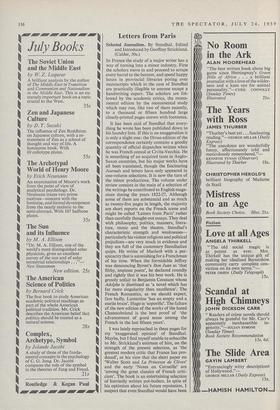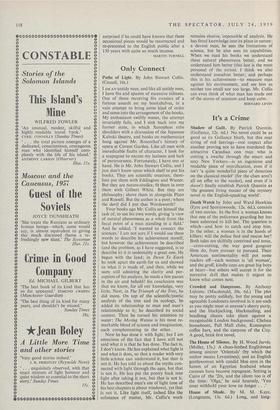Letters from Paris
Selected Journalism. By Stendhal. Edited and Introduced by Geoffrey Strickland. (Calder, 30s.) IN France the study of a major writer has a way of turning into a minor industry. First the scholars move in and proceed to scrape every barrel to the bottom, and spend happy hours in provincial libraries poring over manuscripts which in the case of Stendhal are practically illegible to anyone except a handwriting expert. The scholars are fol- lowed by the academic critics, the monu- mental edition by the monumental study which may run, like two of them recently, to a thousand or fifteen hundred large closely-printed pages strewn with footnotes.
It has been said of Stendhal that every- thing he wrote has been published down to
his laundry lists. If this is an exaggeration it is only a slight one: the Divan edition of the correspondence certainly contains a goodly quantity of official dispatches written when he was French consul at Civita-Vecchia. He is something of an acquired taste in Anglo- Saxon countries, but his major works have all been translated, though the fascinating Journals and letters have only appeared in one-volume selections. It is now the turn of the minor productions. The volume under review consists in the main of a selection of the writings he contributed to English maga- zines during the years 1822-27. Although some of them are substantial and as much as twenty-five pages in length, the majority are short reports on the French scene and might be called 'Letters from Paris' rather than carefully thought-out essays. They deal with philosophy, politics, manners, litera- ture, music and the theatre. Stendhal's characteristic strength and weaknesses— part icularly his violent religious and political prejudices—are very much in evidence and they are full of the customary Stendhalian quips. He writes of Macbeth with a per- spicacity that is astonishing for a Frenchman of his time. When the formidable Jeffrey was denouncing Byron's Don Juan as 'that filthy, impious poem', he declared roundly and rightly that it was his best work. He is grossly unfair to Benjamin Constant whose Adolphe is dismissed as 'a novel which has far more singularity than excellence'. The French Romantics, as we should expect, fare badly. Lamartine 'has an empty and a sterile brain'. Hugo is 'soporific'. The failure of the new edition of the works of the hated Chateaubriand is the best proof of 'the advancement of good sense among the French in the last fifteen years'.
I was lately reproached in these pages for my 'exaggerated opinion' of Stendhal. Maybe, but I find myself unable to subscribe to Mr. Strickland's estimate of him, on the strength of the present selection, as 'the greatest modern critic that France has pro- duced', or his view that the short paper on 'Walter Scott and La Princesse de Cleves' and the early 'Notes on Corneille' are 'among the great classics of French criti- cism'. The book is an entertaining selection of hurriedly written pot-boilers. In spite of his optimism about his future reputation, I suspect that even Stendhal would have been
surprised if he could have known that these occasional pieces would be resurrected and re-presented to the English public after a 130 years with quite so much incense.
MARTIN TURNELL







































 Previous page
Previous page